A Complete Guide to Choosing the Perfect Wedding Rings
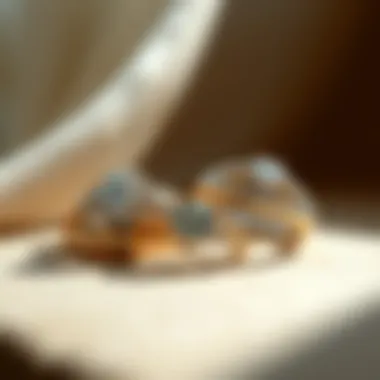
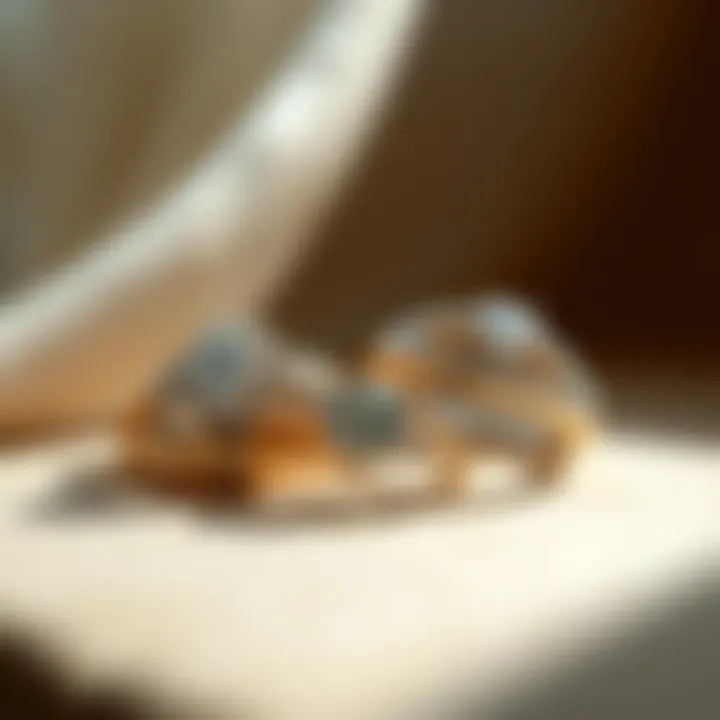
Intro
Selecting the perfect wedding rings involves more than just choosing something beautiful. It’s a blend of emotions, culture, and individual preferences, underscoring a commitment that typically lasts a lifetime. Rings can symbolize love not only through their aesthetic but through the materials and gems chosen, each having its unique story and significance. With intricate craftsmanship and a myriad of options available, there arises a need for an insightful guide to navigate these elements wisely.
Understanding the nuances related to purchasing wedding rings can empower buyers to make more informed decisions. This guide aims to shed light on the essentials, covering everything from materials and styles to cultural interpretations and budget considerations. Each choice intertwines with the emotional aspects of this life-changing event, ensuring that when the big day arrives, the ring symbolizes more than just a promise—it is a testament to shared lives and dreams.
Selecting a wedding ring isn’t a mere shopping trip; it’s an experience steeped in tradition, love, and personal expression. Let’s delve deeper into the crucial aspects you should consider while embarking on this journey.
Understanding Wedding Rings
When it comes to wedding rings, these small circles of metal hold immense significance, embodying deep emotional ties and timeless traditions. It's not merely about style or value; it's about the narrative interwoven with love, commitment, and promise. Whether you're navigating the tricky waters of engagement or simply exploring what makes these rings special, understanding their importance sets the stage for every choice that follows.
Wedding rings symbolize an unbroken circle, representing eternal love and commitment. This concept of infinity resonates globally, making wedding rings a central piece of wedding ceremonies in various cultures. Within this discussion of wedding rings, we delve into the myriad elements that enhance their value and relativity.
- Emotional Significance: From the moment you slip a ring onto a loved one's finger, a personal history begins. It's an intricate mix of emotions tied to the person wearing it, making it far more than an accessory. Each ring has the potential to evoke memories of significant life moments, cherished milestones, or shared dreams.
- Tradition and Ritual: The age-old tradition of exchanging rings dates back centuries, with varying customs across cultures. Understanding these norms gives insight into their ever-present role in weddings. It’s crucial for buyers to appreciate the history and meaning behind their choice, as it guides them toward a ring that resonates with their personal narrative.
- Craftsmanship and Material Choices: Every ring is a product of artistic expression. The metal, gemstones, and overall design reflect individuality and personal taste. It’s essential for buyers to grasp the quality of materials and the expertise that goes into crafting these pieces, allowing them to make informed decisions that align with their values.
It's clear that understanding wedding rings involves much more than merely selecting one to wear. It opens up a deeper dialogue about love, life, and the journey we undertake together. By grasping the symbolism and cultural variations connected to these rings, buyers can appreciate their significance to a greater extent.
The Symbolism Behind Wedding Rings
The notion behind wedding rings transcends mere aesthetic appeal; it stretches into symbols of trust and protection. The circular design, void of beginning and end, represents a commitment that, ideally, remains unbroken throughout the couple’s journey together.
"A ring is not just metal; it’s a bond sealed with promises."
Historically, different cultures assigned expressed meanings to wedding rings. For instance, in Roman traditions, men often gave rings as tokens of ownership and status, while in today’s world, the exchange signifies mutual respect and partnership. Always consider what the ring signifies to you and your partner, transforming it into a piece of personal heritage and promise.
Cultural Variations in Wedding Ring Traditions
The beautiful world of wedding rings is colored by cultural nuances, each adding unique flavors and meanings to the ceremonial exchange. For instance:
- In Hindu culture, a mangalsutra often substitutes a ring, symbolizing marital status and sacred marriage vows.
- In Jewish traditions, the groom places a simple band on the bride's finger, emphasizing the act over the material value.
- The exchanging of rings in Western cultures highlights the emotional rather than physical connection, focusing on the love that binds two individuals.
Understanding these traditions gives buyers valuable context; learning what meticulously crafted pieces represent in various societies can enhance the emotional weight of one’s selection. By weaving this knowledge into your purchase, you create an experience that goes well beyond just choosing a ring. It becomes a tapestry of love story steeped in cultural resonance, ensuring you and your partner carry not just a ring, but a shared legacy.
Choosing the Right Material
Selecting the right material for wedding rings is perhaps one of the most critical steps in the purchasing process. It encompasses not only aesthetic preferences but also practical considerations. The durability, maintenance needs, and emotional significance of the wedding rings can all hinge on the chosen material. Therefore, understanding the range of available options and their implications is essential for making an informed decision.
Gold: A Timeless Choice
Different Karats of Gold
When it comes to gold, the measurement of karats plays a vital role in assessing its value and quality. The karat indicates the purity of gold with 24 karats being pure gold. Lower karat numbers, such as 14K or 18K, blend gold with other metals, enhancing durability while altering color and appearance. This blending can be a game-changer for those whose lifestyles might lead to wear and tears on jewelry. Choosing a higher karat can indeed bring out a richer, vivid gold hue but may also come with the risk of scratches and dents due to its softness. Therefore, for everyday wear, considering the balance between purity and strength provides a tangible edge.
The Allure of White Gold
White gold creates a sleek, modern touch that has captivated many engaged couples. It’s important to note that white gold is an alloy that combines yellow gold with metals like palladium or nickel, resulting in a shiny, silver-like appearance. This material is adored for its adaptability and often features rhodium plating, enhancing its reflective qualities. However, the rhodium may require reapplication over time, which adds to maintenance considerations. Thus, while it offers an elegant finish, the long-term upkeep shouldn't be overlooked.
Exploring Rose Gold
Rose gold has emerged as a darling among choices, particularly appealing to those who appreciate a romantic flair. This alloy comprises gold and copper, which gives it that charming pinkish hue. Its unique color not only sets it apart but also accentuates the warmth of any gemstone set within. One significant attribute of rose gold is its excellent durability, partly due to the copper content, making it less prone to scratches. That said, some individuals may experience allergic reactions to copper, albeit this is quite rare. Ultimately, rose gold garners admiration for its nostalgic appeal partnered with modern sensibilities.
Alternative Metals: Titanium and Platinum
Benefits of Titanium
Titanium, a metal admired for its superior strength and lightweight nature, is an option that is increasingly gaining traction in the wedding ring market. Its resistance to scratching and bending makes it an excellent candidate for those who lead active lifestyles. Not only is it hypoallergenic, which assures comfort for sensitive skin, but its versatility allows for varied finishes, matte or polished. Thus, selecting titanium brings forth a blend of modernity and durability, appealing to couples with a taste for the unique. On the flip side, though, titanium rings can be difficult to resize, posing a challenge if size adjustments become necessary later.
Characteristics of Platinum
Platinum rings hold a reputation for being the pinnacle of elegance and durability. As one of the rarest metals on Earth, it carries a weight and heft that many find appealing. Its natural white sheen remains unchanged over time, unlike some other metals that may tarnish. Platinum’s density also provides a secure setting for stones, making it a preferred choice for intricate designs. However, it comes with a heftier price tag compared to gold and requires periodic polishing to maintain its luster. Understanding both its immediate beauty and long-term needs is foundational when considering platinum for wedding bands.
Gemstone Accents: Adding Color and Flair
Popular Gemstones for Wedding Rings
Incorporating gemstones into wedding rings transcends mere aesthetics. By adding colored stones, couples often convey personal stories or symbols of their relationship. Popular choices include sapphires, emeralds, and rubies, which each carry different meanings. For example, sapphires symbolize loyalty and nobility, making them an excellent alternative to traditional diamonds. The uniqueness of these stones can set a ring apart, allowing for individual expression that might align more closely with one’s personal values or heritage. Nevertheless, it’s crucial to consider durability as some stones may require extra care over time depending on their hardness.
Understanding Gemstone Grades
Grading gemstones involves several factors, including cut, clarity, color, and carat weight—the famed four Cs of gemstones. Each of these aspects contributes to a stone's overall beauty and value, influencing its durability as well. When choosing a gemstone for a wedding ring, understanding these grades is pivotal. Higher-grade stones often boast better durability and aesthetic appeal but come at a steep price. Therefore, navigating the gemstone market can be daunting, yet it allows buyers to make informed choices that align with their budget and taste while highlighting the unique qualities of the stones themselves.
Deciding on Ring Styles
Deciding on the right ring styles is a cornerstone in the journey of selecting wedding rings. This choice shapes not just the visual aspect but also the emotional resonance of the rings that will signify a couple's lifelong commitment. Styles can range from classic designs to contemporary twists, each with its distinct character and meaning. It is essential for couples to reflect on their personal tastes and shared visions. The right ring style will not only catch the eye but also convey the essence of the relationship, making it pivotal in the decision-making process.
Classic Engagement Bands
Classic wedding bands hold a timeless appeal that can resonate with many couples. Their simplicity often represents purity and commitment, which is why they remain popular.
Simplicity in Design
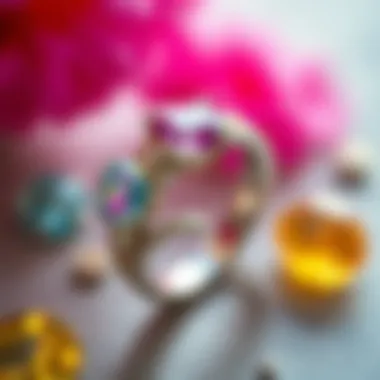
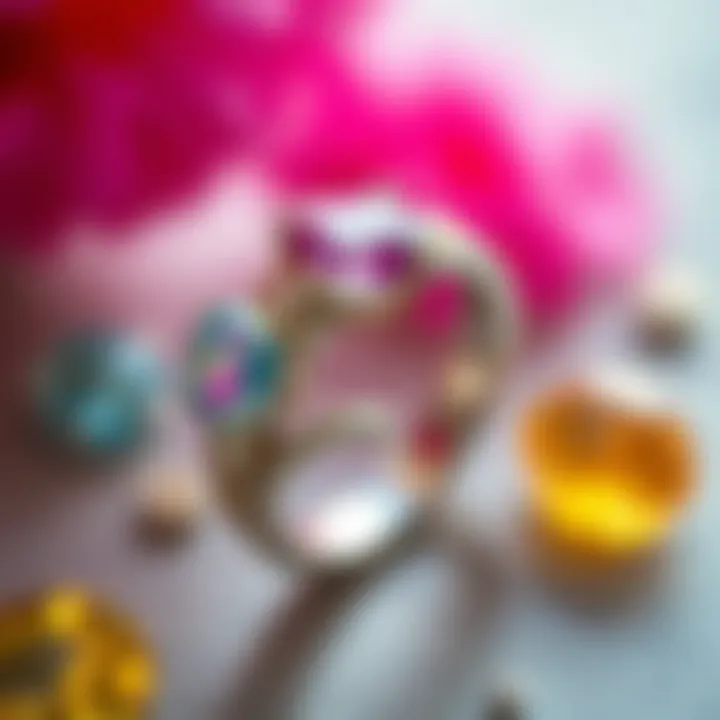
Simplicity in design is a hallmark feature of classic engagement bands. These rings usually have clean lines without excessive ornamentation, making them inherently elegant. The beauty lies in their understated nature, which mirrors the seriousness of the commitment. Many find that this simplicity can work as a blank canvas, allowing the significance of the ring to stand out rather than competing with ostentatious elements. However, it can also mean limited customization options. Thus, couples often need to weigh the appeal of refined beauty against the desire for a more personalized touch.
Emphasis on the Center Stone
Another key characteristic of classic bands is the emphasis on the center stone, which often serves as the focal point of the ring. This design choice elevates the impact of the gemstone and can amplify its brilliance. By concentrating on this singular element, the ring becomes a statement piece, showcasing the care that went into the selection of the stone. Some might argue that, while this style amplifies the stone's presence, it might overshadow the ring's overall design and leave little room for additional decorative features. Nonetheless, the emphasis on the center stone embodies a deep personal significance and can serve as a lasting memory.
Contemporary and Unique Designs
As couples look to represent their individuality, contemporary and unique designs are gaining traction. These styles break away from tradition and often incorporate personalized elements, making the rings feel like true reflections of the couple's story.
Seeking Unconventional Shapes
Seeking unconventional shapes is an exciting avenue for couples looking to express their uniqueness. Instead of the traditional round or square settings, some might opt for oval, pear, or even more asymmetrical designs. These shapes can symbolize the couple's desire to break from conventions and create their own path. However, a downside could be the potential for limited choices when it comes to matching wedding bands. In some cases, these designs may not complement other pieces of jewelry. Regardless, the choice can make a bold statement and offers a fresh spin on a cherished tradition.
Integrating Personal Elements
Integrating personal elements into the ring design is a growing trend that emphasizes the uniqueness of each relationship. Couples can incorporate birthstones, engravings, or motifs that hold personal significance, making the ring a narrative artifact rather than just a piece of jewelry. This integration results in a ring that tells a story, transforming the piece into a nostalgic item once a memory is attributed to it. However, customizations may lead to complexities in the design process, and it’s always vital to work closely with a jeweler who understands the couple’s vision to avoid misinterpretations.
Matching Wedding Bands
Matching wedding bands can bring a sense of unity and complementarity to the couple's jewelry choices. This section will delve into what makes harmonized designs appealing and the importance of comfort fit.
Harmonizing Designs
The concept of harmonizing designs in wedding bands plays a significant role in achieving a unified appearance. When both partners select bands that complement each other, it not only signifies their connection but also presents a cohesive aesthetic. Whether the designs feature similar textures or shared motifs, the choreography of rings can mirror the couple's bond. On the flip side, individual preferences can sometimes clash, leading to a few compromises. Hence, couples should engage in open discussions about their aesthetic desires to make sure they are both on the same page.
Considering Comfort Fit
Considering comfort fit is crucial when choosing rings that will be worn every day. Comfort-fit bands have rounded edges on the inside, allowing for a more pleasant wearing experience. This factor cannot be overstated, as an uncomfortable ring can be a constant distraction. While many target the appearance, the reality of everyday wear often trumps mere visual appeal. However, some might find comfort-fit styles less suited for intricate designs. Thus, balancing personal comfort with tastes becomes essential for a satisfying purchase.
"A wedding ring is not just a piece of jewelry—it encapsulates love, commitment, and everlasting partnership. Choosing the right style enhances the meaning behind it."
By thoughtfully considering the various styles available, couples can navigate this process with clarity and confidence, ultimately leading to a selection that truly reflects their unique bond.
Budgeting for Wedding Rings
When it comes to purchasing wedding rings, budgeting is often an overlooked but crucial aspect. Couples regularly find themselves swept away by the emotional significance of rings, and as a result, they may lose sight of their financial landscape. Sticking to a budget ensures that you make informed decisions without the burden of unnecessary financial strain down the road. It’s not just about finding a ring that shines; it’s about finding one that fits into your broader financial picture. Budgeting involves assessing what you can afford, factoring in the cost of materials, design, and any potential hidden charges that could arise.
Establishing a Realistic Budget
Assessing Financial Resources
Knowing your financial resources is the first step in setting a budget. Take an inventory of all your assets, whether it’s savings from the bank, investments, or even cash gifts. This approach allows you to form a realistic view of your financial health. The key characteristic of assessing financial resources is that it helps pinpoint what you can truly spend without breaking the bank.
When you understand your available resources, you may breathe easier, knowing you won't end up accumulating debt while celebrating your love. It’s a beneficial starting point for couples who want a clear cut path and ensures you don’t risk your financial stability.
For those with limited resources, finding budget-friendly options like sales or financing could be life-savers. On the flip side, it might be tempting to splurge if you've got a bit of extra cash coming in. Try to remember, though, your long-term happiness often hinges on smart financial planning rather than extravagant purchases.
Understanding the Price Spectrum
Next, it’s important to grasp the price spectrum of wedding rings. Prices can fluctuate wildly based on various factors like material, design complexity, and even the jeweler’s brand. Recognizing this aspect is vital since it allows for better decision making during your search. If you’re eyeing a beautiful platinum ring, understanding the price range can guide you toward similar styles that might be more budget-friendly.
The key characteristic here is the breadth of choices fitting various budgets. Knowing how much rings can cost serves as a great parameter to filter your options. The unique feature of understanding the price spectrum is that it can help you avoid unwarranted surprises later on.
However, there can be disadvantages too. Sometimes the lowest-priced rings may compromise on quality, making it crucial to balance price and quality. Be aware of how gold or platinum content, gemstone cuts, and craftsmanship can impact your budget.
The Impact of Materials and Design on Pricing
Cost Factors in Precious Metals
When considering materials, the costs associated with precious metals are pivotal. Gold, platinum, and silver all come with their own respective price points influenced by market demand and resource availability. The key characteristic of these factors plays a major role in overall pricing, making it pivotal for budgeting.
Gold rings, for example, are generally more affordable than platinum ones, which is largely due to the rarity and durability of platinum. Understanding these dynamics can only benefit the purchasing process. The unique feature here is that prices are not static; they're influenced by global market trends and fluctuations. This means that when you decide to purchase could impact the price significantly.
In this article, exploring the cost factors gives you insight into how to make wise choices. It also helps alleviate potential disappointments associated with unintended costs.
Effect of Gemstones on Price
Gemstones can also impact the final price of your wedding ring quite a lot. Different types of stones vary widely in cost, with diamonds, sapphires, and emeralds each holding different market values. The key characteristic of this is the quality grade of the gemstones, which plays a crucial role in their pricing.
For the discerning buyer, recognizing the effect of gemstones on overall expenses can guide you in making smart decisions beyond just their aesthetic appeal.
The unique feature of this aspect is that it can sometimes lead to unexpected savings. For instance, opting for colorless or lesser-known gemstones can save you quite a bit of cash while still allowing you to possess a unique, personalized ring. Conversely, buying a high-grade diamond will be a significant expense, which is something to keep in mind when budgeting.
Potential Hidden Costs
Insurance Considerations
Considering insurance is a vital, yet often underestimated, part of budgeting for wedding rings. Many couples overlook this detail until it’s too late. Insurance serves as a protective umbrella, guarding against theft, damage, or loss. The key characteristic of incorporating insurance into your plans is its preventative nature, as it helps manage future risks and provides peace of mind.
Some might view this as an additional unnecessary expense, but real security is invaluable. Hidden costs like this can sneak up if left unaddressed, so it’s beneficial to factor insurance into the equation from the get-go.
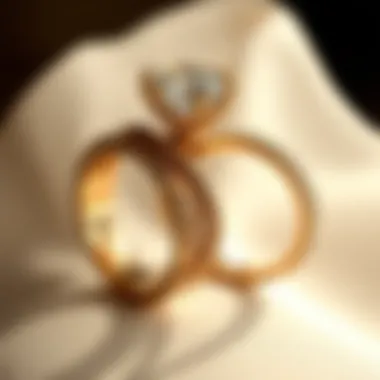
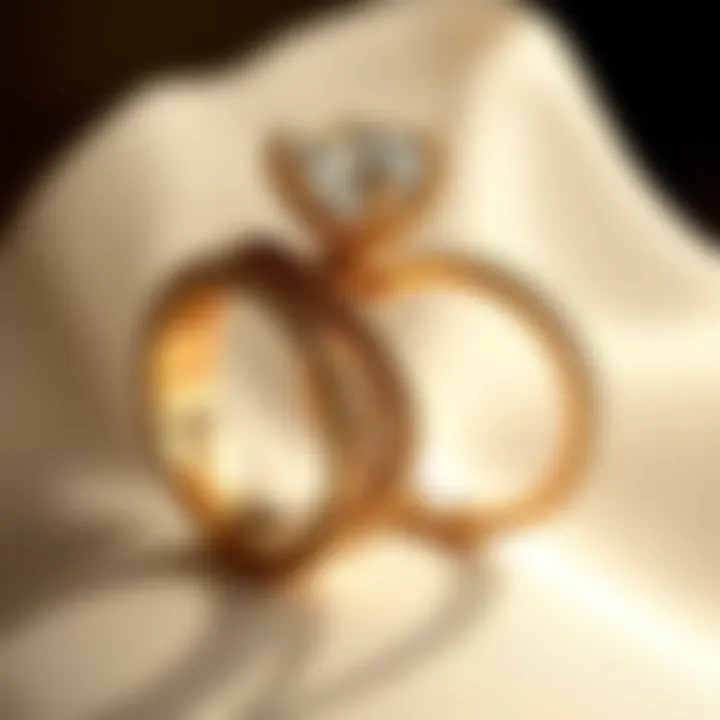
However, it might also lead to ongoing costs that accumulate over time. Periodically reviewing your insurance policy can ensure you always remain covered in line with the ring’s potential value increase.
Long-Term Maintenance Expenses
Long-term maintenance expenses can be another unexpected financial burden. Over time, your wedding ring will likely require cleaning, inspections, or even repairs. The key characteristic of maintenance to understand is that it helps prolong the ring's life.
Regular check-ups can prevent larger issues down the road, which is why it’s beneficial to budget for these costs upfront. A unique feature is that some jewelers offer maintenance plans, but be cautious—an upfront fee might lead to overspending if not carefully reads the terms.
Realizing these hidden expenses from materials and routine care will assist you in maintaining the ring, and ensure that your love symbol stands the test of time.
Sizing the Perfect Ring
When it comes to wedding rings, getting the size just right is a fundamental step that can often be overlooked. It is not merely a question of comfort; rather, it reflects a deeper understanding of the significance behind the ring itself. After all, this piece of jewelry symbolizes a lifelong commitment, and if it’s ill-fitting, it could lead to potential issues later on.
Not only does the right size enhance the ring's aesthetic appeal, but it also plays a crucial role in its durability. A ring that’s too tight may cause discomfort or be at risk of being damaged or lost, while a loose one might slip off at inopportune moments. Thus, taking the time to understand and address sizing will serve you well in the long run.
Understanding Ring Sizes
Standard Sizing Systems
The concept of standard sizing systems is quite essential when navigating the process of acquiring a wedding ring. In various countries, different sizing systems are employed, such as the numerical system common in the UK or the circumference-based system seen in the US.
One major feature of these systems is that they provide a clear and straightforward way for consumers to identify their ring size, which is particularly beneficial. This clarity reduces the guesswork when purchasing both online or in-store.
Unfortunately, these systems also have their downsides. They may not account for the varying shapes of fingers, or for the fact that one's size can fluctuate. Therefore, it’s crucial to understand that while these systems offer a good starting point, they might not be foolproof.
Measuring Your Finger Size
Measuring your finger size is arguably one of the most practical steps in purchasing a wedding ring. Many jewelry shops provide tools and guides to help individuals determine their sizes accurately, making it a common option to consider.
The key characteristic of measuring your finger size is its direct approach: it leaves little to chance. This method allows you to know exactly how the ring will fit on the day of your wedding. However, take care—unique conditions like humidity or heat can affect your measurements, causing fluctuations.
What sets measuring apart is the personal touch. You’re involved in the process of finding the right fit for your finger, which makes it comforting knowing each element has been considered.
Factors Influencing Ring Size
Temperature and Finger Size
One of the more intriguing elements that influences your finger size is temperature. For instance, fingers tend to expand in warmth and contract in colder conditions. This quirky aspect may complicate sizing, especially if you decide to measure in warmer climates during the summer.
The benefit of understanding this factor lies in its practicality. By knowing that temperature can affect fit, individuals can take extra precautions when measuring or shopping for rings. The unique feature here is the importance of timing and context in preparing for an accurate sizing, which can ultimately impact comfort.
Weight Fluctuations
Weight changes can significantly affect finger size as well. For many, this can be linked to lifestyle changes or seasonal shifts in eating and exercise patterns. Weddings are often a stressful time, and it's not uncommon for someone to drop or gain weight.
Recognizing this aspect helps understand ring sizing on a broader level. It means that not only should you be mindful of your current size, but also have an awareness of your body’s fluctuations. The unique feature is that by purchasing the ring with your long-term body plans in mind, you can leave room for future adjustments.
Adjusting Ring Sizes Post-Purchase
Professional Resizing Options
If you happen to find that your new wedding ring isn’t quite right after all, professional resizing options are always on the table. Jewelers often provide resizing services, which can make the ring more comfortable without altering its aesthetic.
This option is a popular choice due to its reliability, ensuring that the integrity of the ring is maintained. The professional touch means that the proper tools and skills are involved, offering a level of sophistication that’s hard to match at home. However, some have voiced concerns over potential metal distortion depending on the intricacy of the design.
DIY Resizing Considerations
For those feeling adventurous, DIY resizing might seem tempting. Some individuals will suggest methods like using resizing beads or even modifying the ring's internal structure. The appeal here lies in cost-saving and immediate results, making it a viable route for many.
However, the unique feature of DIY resizing is that there’s a degree of risk involved with this method. It lacks the expertise found in professional services, and one small slip could lead to greater issues. Thus, DIY might be an exciting option, yet it’s wise to tread lightly.
"Choosing the right fit for your ring is just like picking the perfect partner; it needs to suit you and your lifestyle for the long haul."
Customizing Your Ring
When it comes to wedding rings, the journey often extends beyond merely selecting a ready-made piece. Personalizing your ring is not just about aesthetics; it symbolizes your story and connection. Customizing your ring allows for a unique expression of love and commitment that resonates deeply with both partners. This section delves into the various aspects of customization, from choosing the ideal jeweler to selecting materials and planning for actual delivery. Each step contributes towards making a ring that feels genuinely yours.
The Custom Design Process
Finding a Reputable Jeweler
Finding someone who truly understands your vision can feel like searching for a needle in a haystack. A reputable jeweler plays a pivotal role in the customization process. They should resonate with your aesthetic preferences and provide guidance when needed. Look for stores that display both craftsmanship and transparency in their creations. One essential characteristic of a good jeweler is their willingness to listen. A jeweler who welcomes your ideas and actively includes you in the design process adds considerable value.
In this article, the importance of finding someone trustworthy can’t be overstated. Consider going through reviews or getting recommendations from fellow couples; their experiences can provide a wealth of information on which jewelers uphold a good reputation.
Collaboration on Design Elements
Collaboration is where the magic happens. Working with your jeweler, you can fuse unique ideas and intricate designs into a coherent piece that reflects both personalities. This is particularly beneficial, as it leads to a ring that is one-of-a-kind, not something that can be found in every store window. Elements like engraving or the integration of personal symbols become the cherry on top of this customized creation.
During this collaborative process, keep communication open. Discuss the styles you admire, and share any sketches or images that resonate with your vision. A successful collaboration allows the jeweler to understand your desires better and propose ideas that you might not have considered, making the experience enriching.
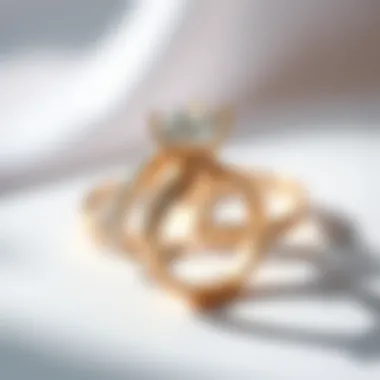
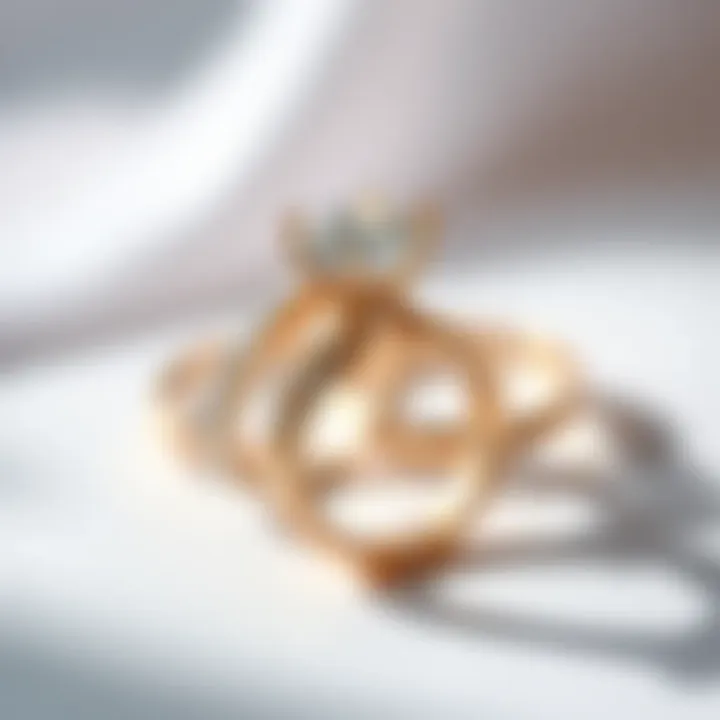
Materials in Custom Rings
Selecting Unique Gemstones
When considering customization, the choice of gemstones can significantly amplify the ring's personality. Opting for unique gemstones sets your ring apart from conventional choices, often leading to captivating conversations. Whether it’s a vivid blue sapphire or a deep green emerald, selecting a gemstone aligned with personal values or experiences adds a layer of meaning to the piece.
There's an allure to less common gemstones; they oftentimes embody history and rarity. Additionally, unique gemstones provide opportunities for synchronization with cultural significance—something that goes beyond mere decoration. However, it’s crucial to also evaluate the durability of your chosen gemstone.
Choosing Metals for Customization
The metal chosen for the ring is equally important as it defines not just the durability but also the overall aesthetic. Popular choices typically include gold, platinum, and even alternative sources like cobalt or tungsten. Each metal carries a different weight, appearance, and even cultural symbolism.
Selecting a metal can be daunting, particularly because it often contributes to the overall cost and maintenance. For instance, while platinum is recognized for its timelessness and strength, it tends to be pricier than gold. Consider your daily lifestyle too—some metals might scratch or wear down faster, so keeping your daily habits in mind is key.
Time Considerations for Custom Orders
Understanding Production Timelines
This aspect carries crucial weight in the customization journey. Unlike purchasing an off-the-shelf ring, customizing gestures require planning and thoughtfulness. The production timeline varies widely based on the intricacies of your design and the jeweler’s current workload. Understand that patience is essential. Discuss production timelines upfront to align your expectations with reality, avoiding any distress closer to your wedding date.
Proactive discussions with your jeweler about creating a detailed timeline can help ease anxiety, ensuring everyone is on the same page.
Planning for Delivery
Once the customization process is wrapped up, you will need to consider how the ring gets to you. Planning for delivery is just as important as all the previous steps. Whether you choose in-store pickup or need shipping, factor in the possible delays that may arise from your jeweler's timeline. Make sure to communicate with your jeweler about your exact needs.
Arranging for insurance during delivery ensures that, should any unfortunate mishaps occur, you are protected. A ring with such personal value deserves the utmost care right from your jeweler to your hands.
"A personalized wedding ring is not only a unique creation; it's a lasting testament to your love story. Every small detail tells a part of that tale."
Ultimately, customizing your wedding ring reflects not just your personal style but the unique journey you and your partner have embarked on together. The creativity involved, along with thoughtful planning, helps ensure that your wedding ring will truly be a piece that resonates deeply over the years.
Caring for Your Wedding Ring
Caring for your wedding ring is not just about keeping it shiny; it’s about preserving the memories, emotions, and importance it embodies. This piece of jewelry often represents a lifelong commitment, serving as a daily reminder of love and partnership. Thus, understanding how to keep it in tip-top shape is paramount. Proper care ensures the ring not only retains its aesthetic appeal but also maintains its structural integrity for years to come.
Routine Maintenance Practices
Routine maintenance revolves around two main facets: regular cleaning and professional inspections. Both of these practices ensure that your wedding ring remains in excellent condition and is ready to be cherished each day.
Regular Cleaning Techniques
Cleaning your ring is essential to remove grime, oils, and dirt that accumulate over time. Think about the times when you wash your hands and notice how easily soap can leave behind residues. If that soap gets trapped beneath your ring, it can lead to unwanted tarnishing or discoloration. Using a simple solution of warm water and a few drops of mild dish soap can work wonders.
- Key characteristic: The simplicity of regular cleaning makes it an easily adoptable practice.
- Unique feature: Most cleaning methods require items that are readily available at home, making them cost-effective.
- Advantages: Routine cleaning helps to maintain brilliance and reduce the chance of scratches, as debris won't be left to settle.
- Disadvantages: However, too aggressive scrubbing can lead to scratches on softer metals, so it’s important to choose gentle techniques.
Professional Inspections
While cleaning is something you can handle at home, periodic professional assessments are just as critical. Much like a car, your wedding ring also needs a regular check-up to ensure its overall health. Jewelers often have the expertise to identify issues you might not notice.
- Key characteristic: These inspections can catch potential problems before they escalate, such as loose stones or weakening settings.
- Unique feature: Professional jewelers often use tools designed specifically for this purpose, which can assess the ring's condition more thoroughly than the naked eye.
- Advantages: Regular inspections can provide peace of mind, ensuring that your ring is reliable and safe to wear.
- Disadvantages: On the flip side, some may find the cost of professional services a burden, yet it is often a worthy investment when considering long-term wear.
Protecting Your Ring from Damage
Beyond routine maintenance, protecting your wedding ring from everyday wear and tear is another vital aspect. Damage can happen when least expected, and taking proactive steps is key to its longevity.
Avoiding Abrasion and Scratches
Tabling this aspect requires awareness of your daily activities. Engaging in tasks that involve hard surfaces can result in scratches or even dents, particularly on softer metals like gold.
- Key characteristic: Being proactive about where and when you wear your ring can significantly decrease the risk of damage.
- Unique feature: One can invest in silicone bands for more hazardous activities, providing both safety and a stylish alternative when you need to remove your original ring.
- Advantages: Should you avoid damaging your ring, you'll prolong its life and keep it looking brand new.
- Disadvantages: However, this may mean temporarily forgoing your beloved ring during certain tasks, which could feel emotionally taxing.
Safe Storage Practices
If you’re not wearing it, how you store your wedding ring can have major implications on its durability. Tossing it into a jewelry box haphazardly can lead to scratches and tangles with other pieces. Instead, invest in a dedicated ring holder or pouch.
- Key characteristic: A proper storage option minimizes the risk of accidental damage.
- Unique feature: Soft pouches or cases often come cushioned, which can protect rings from impact.
- Advantages: Safe storage not only keeps your ring in pristine condition but also makes it easier to locate when you're ready to wear it again.
- Disadvantages: However, it might require a small adjustment in your routine to ensure consistent care.
End and Final Thoughts
Purchasing a wedding ring is much more than selecting a band of metal or a piece of jewelry. It is an intersection of values, memories, and aspirations. This concluding section encapsulates the key aspects covered throughout the article, emphasizing the importance of making informed choices that resonate with your personal journey and relational milestones.
Reflecting on Personal Values
Every couple has their own story, and these values shape choices in ways that go beyond mere aesthetics. When selecting a wedding ring, individuals should consider how these rings mirror their unique bond.
- Sentimental Value: Consider what the ring represents. For many, it's a symbol of love, commitment, and a shared future. Whether it’s an heirloom passed down or a customized creation, the significance behind the object often exceeds its material worth.
- Cultural Values: Different cultures offer various traditions surrounding wedding rings. Recognizing these can aid in understanding your partner's perspective and values, ultimately strengthening the connection between partners.
- Sustainability: In today’s context, the choice of ethically sourced materials also carries enormous weight. Many buyers seek out gemstones and metals that align with their values about environmental stewardship, pushing past the traditional finds to explore sustainably mined options.
The Enduring Significance of Wedding Rings
Wedding rings serve as a timeless reminder of promises made, and their significance goes far beyond the initial exchange.
- A Lasting Investment: Unlike many purchases that depreciate, a well-chosen wedding ring often retains or increases its value over the years. Investing in quality and craftsmanship can turn what appears as a lavish expense into a financial safeguard that embodies love and loyalty.
- Cultural Heritage: Rings represent cultural experiences, often intertwining styles and designs from various heritages. A ring can serve as a tangible piece of a couple's background and traditions, bridging gaps between different worlds and creating a lasting legacy.
- A Personal Journey: Its presence on the finger continues through life’s stages—symbolizing the commitment during the highs and lows of marriage. Be it anniversaries or milestones, the ring remains a witness to a couple’s journey together.
In essence, the decision regarding wedding rings should be approached thoughtfully. It requires a harmonious blend of personal values, aesthetic preferences, and practical considerations. Such reflections will not only facilitate a clearer decision-making process but will also weave deeper into the fabric of one’s life together.
"Choosing a wedding ring is like writing a promise in metal; it’s a telling of a love story that extends through time."
By taking the time to explore these various layers, couples can find a piece that encapsulates their journey—it’s not just metal and gems; it's the story of love, commitment, and unity.







